Table of Contents
Bichon Frise behavior problems can be a concern for owners of this small, fluffy dog breed. As a loving and affectionate breed, Bichons are known for their cheerful disposition and friendly nature. However, some Bichon Frises may exhibit behavioral issues that can lead to stress for both the dog and their owners.
Understanding these behavior problems is crucial to efficiently addressing them and promoting a happy and healthy relationship with your furry companion. Common problems include separation anxiety, excessive barking, and issues with house training.
Fortunately, with consistent and positive training techniques, you can work with your Bichon Frise to address these issues and build a stronger bond with them.
Key Takeaways
- Bichon Frises are generally friendly and cheerful, but they may still experience behavioral issues.
- Common behavior problems include separation anxiety, excessive barking, and house training difficulties.
- Consistent, positive training methods can help address these problems and strengthen the bond with your Bichon Frise.
Understanding Bichon Frise Behavior
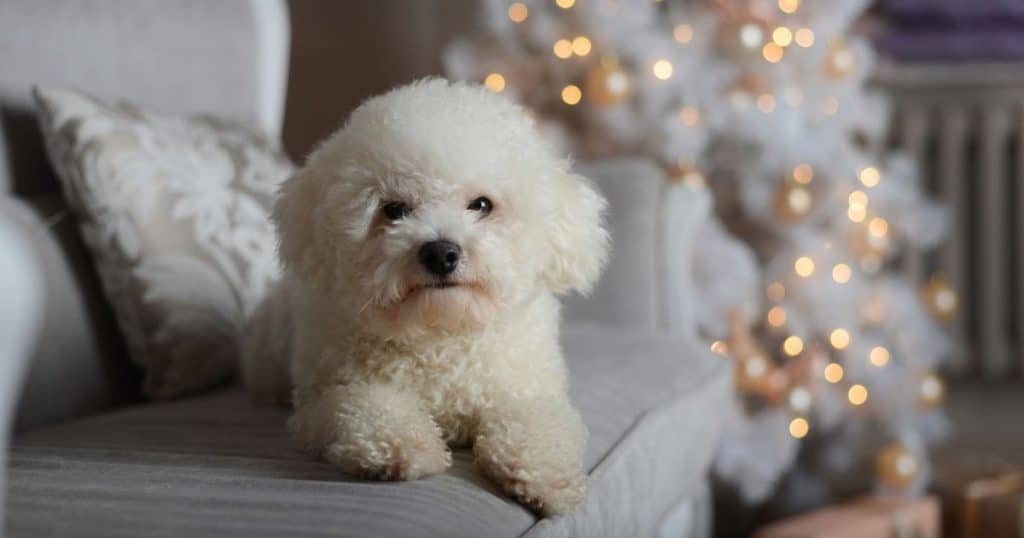
The Bichon Frise is a small, fluffy dog breed known for its friendly and affectionate temperament. When it comes to understanding Bichon Frise behavior, it’s essential to consider various aspects of their personality and upbringing to address any potential issues.
In general, Bichon Frises are known for their sociable nature, making them excellent companions for families and individuals alike. They tend to get along well with other animals and people due to their gentle and friendly demeanor.
While they are typically very adaptable to different environments, these dogs do require proper socialization from a young age to ensure well-adjusted behavior and minimize any potential issues.
One common problem that some Bichon Frise owners may face is separation anxiety. Like any other breed, Bichon Frises can develop anxiety when left alone for extended periods, leading to destructive behavior or excessive barking.
It’s crucial that I train my Bichon Frise to tolerate short periods of separation and gradually increase these durations, ensuring they feel comfortable and secure when alone.
Another aspect to consider when it comes to understanding Bichon Frise behavior is their intelligence and energy levels. These little dogs can be quite smart, meaning that they require mental stimulation to remain happy and satisfied.
Providing them with interactive toys, puzzles, or engaging in activities such as training and agility exercises can help prevent boredom and related behavioral problems.
As with any breed, proper training and socialization are essential in preventing Bichon Frise behavior problems.
Consequently, I need to ensure that my dog is exposed to various people, animals, and environments from an early age. Consistent positive reinforcement and patience during the training process will help my Bichon Frise understand boundaries, expectations, and appropriate behavior.
In conclusion, understanding and addressing Bichon Frise behavior comes down to recognizing the breed’s specific needs and characteristics.
By providing proper socialization, training, mental stimulation, and addressing separation anxiety, I can ensure that my Bichon Frise will be a well-behaved and happy companion.
Common Bichon Frise Behavior Problems
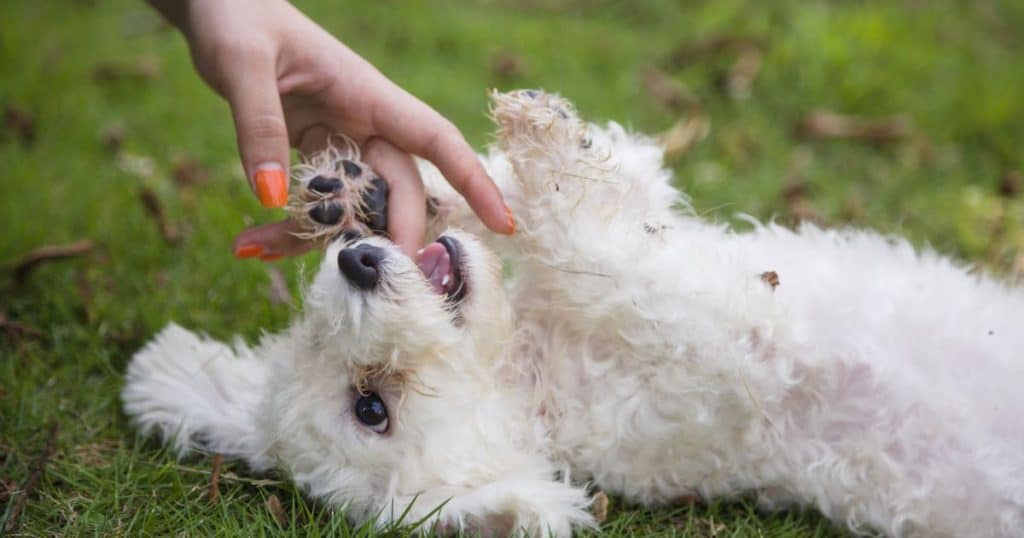
Barking and Anxiety Related Issues
As a Bichon Frise owner, I’ve noticed that one of the common behavior problems in this breed is excessive barking and anxiety-related issues. Bichon Frises, like many small dogs, may be prone to barking at unfamiliar noises, other animals, or people approaching their territory.
This can be exacerbated by anxiety and separation anxiety when left alone for extended periods. To help alleviate this behavior issue, proper training and socialization can help to reduce anxiousness in your Bichon Frise.
Destructive Chewing and Biting
Destructive chewing and biting can also be a concern in Bichon Frises. As a breed known for their playful nature, Bichon Frises may engage in destructive behavior, such as chewing on furniture or biting on various objects.
This behavior can be controlled with consistent and firm training, redirecting the chewing or biting to appropriate toys and providing regular physical and mental stimulation.
Aggression and Fear Responses
Despite their friendly and affectionate nature, some Bichon Frises may exhibit aggression and fear responses. This can manifest as snarling, nipping, or snapping when they feel threatened or scared.
Early socialization with other dogs and people can help to minimize fear aggression in Bichon Frises. Should your Bichon Frise display aggressive behavior, consulting a professional dog trainer or behaviorist is recommended.
Possessive and Territorial Behaviors
Some Bichon Frises might exhibit possessive and territorial behaviors. This can stem from them being protective over their belongings, food, or even their owner.
To prevent this behavior problem, early training and boundary-setting exercises can help to establish a healthy owner-dog relationship.
Bichon Frise Health Problems Impacting Behavior
Certain health issues can contribute to behavior problems in Bichon Frises. For instance, bladder stones, ear infections, cataracts, and diabetes can negatively affect their mood and behavior.
An essential step in managing these behavior issues is to ensure your Bichon Frise receives regular veterinary care, which can help to identify and treat health-related behavior problems.
By addressing these common behavior problems in Bichon Frises and providing appropriate training, socialization, and veterinary care, owners can help their beloved pets live a happier and more well-adjusted life.
Training Techniques and Strategies
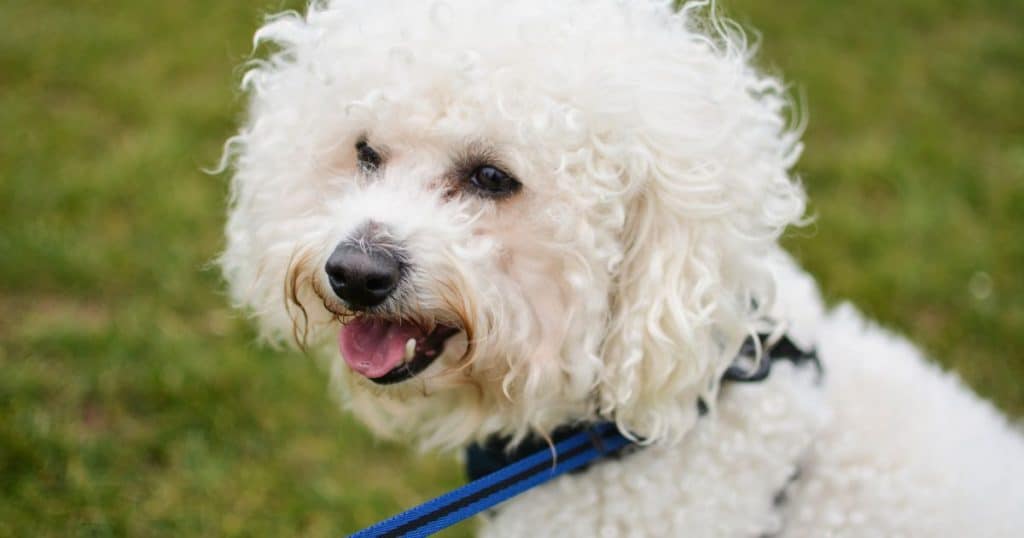
When it comes to addressing Bichon Frise behavior problems, it is essential to have the proper training techniques and strategies in place. As an expert in dog training, I will guide you through some important aspects of training your Bichon Frise.
Socialization and Desensitization
Early socialization is crucial for any breed, but especially so for the Bichon Frise as they can be prone to anxiety and fearfulness in new situations. To begin the socialization process, expose your Bichon Frise puppy to various environments, people, and other animals. This will help them become more comfortable in various situations and lessen the likelihood of display fear-based behaviors.
Desensitization is another essential strategy in managing your Bichon Frise’s behavior.
This involves gradually exposing them to stimuli that cause fear or anxiety, such as loud noises, unfamiliar people, or other dogs, until they are comfortable with these situations.
Obedience and Crate Training
Obedience training is a valuable tool for addressing any dog’s behavior problems. With the help of a professional trainer and positive reinforcement techniques, teach your Bichon Frise basic commands such as “sit,” “stay,” and “come.” This will help establish a routine and a respectful relationship between you and your dog.
Crate training your Bichon Frise is another useful strategy for managing behavior problems. A crate, when used correctly, can serve as a safe space for your dog, helping them feel secure and calm. This can be especially beneficial for Bichons who suffer from separation anxiety or other related behavioral issues.
Addressing Specific Behaviors
Some Bichon Frise behavior problems, such as jumping, begging, digging, scratching, and chasing, can be mitigated through proper training techniques. For example, if your Bichon Frise has a habit of jumping on people, teaching them to “sit” or “stay” when visitors arrive can be an effective solution.
It’s important to remember that consistency, patience, and positive reinforcement are key when addressing any specific behaviors. Working with a professional trainer, if necessary, can provide valuable advice and support.
Exercise and Mental Stimulation
Bichon Frises thrive on daily exercise and mental stimulation. Ensuring that your dog has adequate physical exercise, such as daily walks, fetch, or other playful activities, can help alleviate anxiety and other behavior problems.
Mental stimulation is equally important for Bichon Frises. This can involve interactive toys, puzzle feeders, or even basic obedience training exercises. Providing your dog with both exercise and mental stimulation can significantly reduce the likelihood of developing behavior problems.
Preventing Training Mistakes
To ensure success in addressing your Bichon Frise’s behavior problems, it’s essential to avoid common training mistakes.
Be consistent in your training techniques and routines, avoid punishment-based methods, and seek the help of a professional trainer if needed. With patience and persistence, you can effectively manage your Bichon Frise’s behavior problems and foster a happier, healthier pet.
Bichon Frise Personality Traits
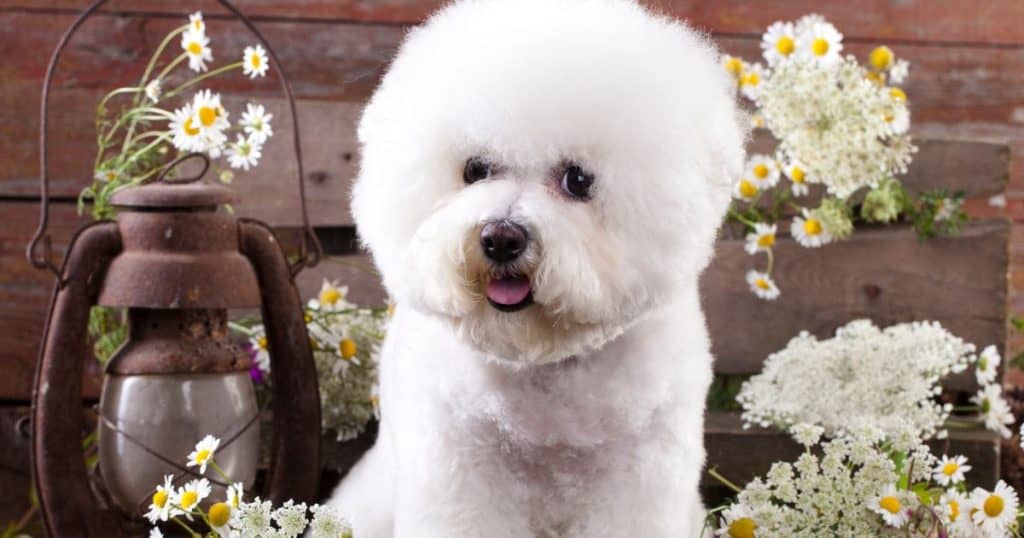
My experience with Bichon Frise breeds has allowed me to understand several key aspects of their behavior and personality traits. These small, fluffy dogs usually exhibit a pleasant, peaceful, and cheerful temperament. Their endearing and friendly nature makes them great companions for all ages, including children.
One particular trait of the Bichon Frise is their independent streak. Although they enjoy spending time with their human families, they are sometimes known to express their independence by exploring or asserting their own ideas.
This can occasionally result in stubbornness, but with proper training and reinforcement, this behavior can be managed effectively.
Bichon Frises are often considered lap dogs due to their size and affectionate behavior. They enjoy cuddling and being close to their human companions. This characteristic makes them excellent therapy dogs, providing comfort, and emotional support to individuals in need.
Their gentle disposition allows them to adapt well to various situations and they are known to be very patient with children, which further reinforces their suitability for therapeutic purposes.
As with any breed, Bichon Frises are not without their potential behavior problems. It’s important to recognize that no dog is perfect, and each will have unique challenges and traits.
Consistent training, socialization, and positive reinforcement from an early age will encourage good behavior and help prevent any potential issues.
In conclusion, Bichon Frises are charming and sociable dogs that make great companions, therapy dogs, and family pets. Understanding their personality traits and common behavior patterns is essential in fostering a successful relationship with these lovable, fluffy companions.
Grooming and Care for Bichon Frises
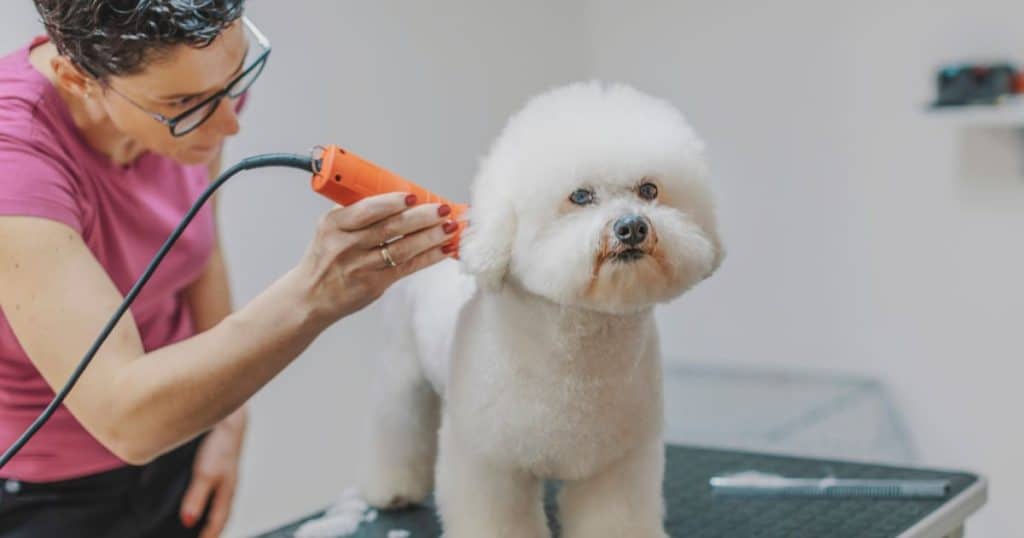
As a dog lover and owner, I recognize that proper grooming and coat care are essential aspects of maintaining a healthy and happy Bichon Frise. These small dogs have some unique characteristics that require specific grooming techniques.
Bichon Frises possess a double coat, with a soft and dense undercoat and a slightly coarser outercoat.
This fluffy, curly coat contributes to their charming appearance but can also result in matting and tangling without regular care. To prevent these issues, it’s necessary to brush your Bichon’s coat at least every other day.
Thorough brushing will not only help prevent matting but will also keep your furry friend comfortable and clean.
Bath time is another essential aspect of grooming these dogs. I recommend giving them a bath every four to six weeks to keep their coat clean and healthy. Using mild dog shampoo is crucial to avoid irritating their sensitive skin. After the shampoo, a good rinse and condition will help maintain their beautiful white coat.
Regular trimming is crucial for Bichon Frises, especially around the eyes and ears. Keeping facial hair neat and clean is beneficial for reducing eye irritation and infections.
If you’re not confident with home grooming, a professional groomer can assist with haircuts every six to eight weeks, which will help to manage the coat length and maintain their hypoallergenic qualities.
Additionally, it’s essential to pay attention to your Bichon’s dental health. Regular teeth brushing with dog-specific toothpaste can prevent dental problems, and providing them with dental chews can offer added benefits.
Taking care of your Bichon Frise’s grooming and coat care might seem like a challenge sometimes, but with patience and consistency, you can manage their gorgeous, curly coat while also preventing behavioral problems that may be associated with discomfort or lack of proper care. Your effort ensures that your furry companion remains healthy and happy, allowing you both to enjoy a stronger bond.
Understanding the Role of Human Interaction
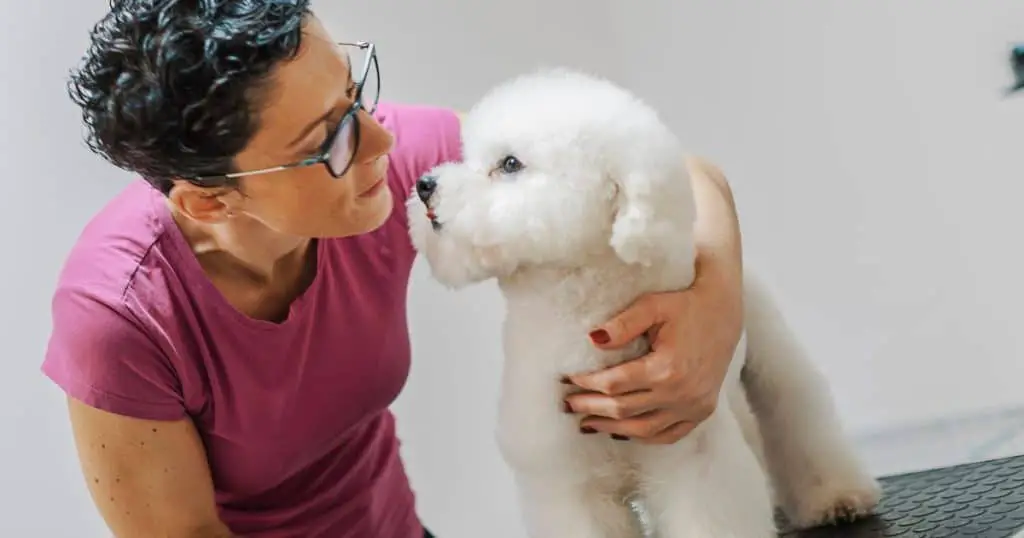
As a dog owner, I’ve noticed that human interaction plays a significant role in shaping a dog’s behavior, and this is particularly true for the Bichon Frise – a small, friendly, and sociable breed. It’s important to understand how our actions and relationships with these dogs can influence their behavior.
In my experience, consistent positive interactions with a Bichon Frise can minimize any potential behavior problems. These dogs thrive on love and affection, and a strong bond with their owner helps them feel secure and confident.
On the other hand, inadequate socialization or irregular interactions can contribute to issues such as separation anxiety, fear-based aggression, and excessive barking.
To provide a positive environment for a Bichon Frise, I’ve found it essential to establish a routine that includes regular mental and physical stimulation. This can include:
- Daily walks and playtime.
- Training sessions focused on basic obedience and fun tricks.
- Puzzle toys and games that challenge their problem-solving skills.
- Socialization with other dogs, people, and environments.
Another crucial aspect of human interaction is attention and communication. It’s important to recognize and address a Bichon Frise’s needs through verbal cues and body language. For instance, if I find my dog displaying signs of anxiety or stress, I’ll take the time to identify the cause and work on reducing those triggers.
In conclusion, it’s essential to appreciate the powerful impact human interaction can have on a Bichon Frise’s behavior. By establishing a strong bond, setting up a consistent routine, and attentively responding to their needs, we can help our furry friends lead happy, well-adjusted lives.
Before You Go
As a Bichon Frise owner, I have personally experienced some of the common behavior problems associated with this breed. However, it is important to remember that these issues can be effectively managed with proper training, socialization, and consistent routines. In this section, we will briefly discuss the pros and cons of owning a Bichon Frise, specifically focusing on their behavior.
One of the major pros of owning a Bichon Frise is their friendly and affectionate nature. These dogs are generally good with children and other pets, making them ideal family pets. Their small size and hypoallergenic coats are also great for people with allergies or living in smaller spaces. Additionally, their intelligence and eagerness to please make them relatively easy to train if consistent methods are used.
However, potential Bichon Frise owners should be aware of some common behavior problems. Separation anxiety can be a significant issue for these dogs, leading to destructive behaviors and excessive vocalization when left alone. Early socialization and crate training can help mitigate this issue. It is crucial to establish a consistent routine to help your Bichon Frise feel more secure when you are not around.
Another common behavior problem in Bichon Frises is excessive barking. This issue can often be managed through training and providing appropriate mental stimulation to prevent boredom. Bichons may also exhibit stubbornness during training, but with patience and positive reinforcement, they can learn to overcome these tendencies.
In my experience, the benefits of owning a Bichon Frise far outweigh the behavioral challenges. By investing time and effort into proper training, socialization, and providing a stable environment, you can enjoy a loving, loyal, and well-behaved companion for years to come.
FAQs
How do you discipline a Bichon Frise?
As a Bichon Frise owner, I know it’s essential to use positive reinforcement when disciplining my dog. This breed responds best to rewards, praise, and consistency. When my Bichon Frise behaves inappropriately, I make sure to use a firm but gentle tone and redirect their behavior towards something positive. For example, if my dog is chewing on a shoe, I’ll replace it with an appropriate chew toy and praise them for playing with the toy instead.
Do Bichon Frises bark excessively?
Bichon Frises can have a tendency to bark, especially if they are bored, lonely, or want attention. In my experience, providing my Bichon Frise with enough mental and physical stimulation, such as engaging in play or walking regularly, helps to significantly reduce excessive barking. Additionally, teaching the “quiet” command can be helpful in managing barking behavior.
Are Bichon Frises prone to separation anxiety?
Bichon Frises are known for their affectionate and social nature, which can make them prone to separation anxiety. To help prevent this issue, I made an effort to gradually increase the time my dog spends alone. Crate training, leaving toys or treats to keep my dog occupied, and creating a comfortable environment can help minimize separation anxiety. It’s important to avoid making a big fuss when leaving or returning home, as this can reinforce anxiety behaviors.
How intelligent are Bichon Frises?
Bichon Frises are intelligent dogs known for their ability to learn quickly and adapt to new environments. I’ve found my Bichon Frise to excel in obedience training and performing tricks. Regular mental stimulation, such as training, puzzle toys, or interactive games, is essential for keeping my Bichon Frise’s mind sharp and content.
At what age do Bichon Frises typically calm down?
While individual experiences might vary, I’ve found that my Bichon Frise started to settle down around 2 years of age. Continued training, regular exercise, and establishing a routine contribute to a calmer and well-behaved dog. It’s important to remember that every dog is different, and patience is key during this process.
How to manage aggressive behavior in a Bichon Frise?
In my experience, early socialization, training, and management techniques can help prevent and address aggressive behavior in a Bichon Frise. If my dog displays aggression, I pay attention to the triggers, such as fear, resource guarding, or territorial instincts, and take steps to address the underlying causes. Seeking professional guidance, such as a dog trainer or a behaviorist, can be beneficial in managing aggressive behavior and ensuring a healthy and balanced relationship with your Bichon Frise.




Leave a Reply
You must be logged in to post a comment.